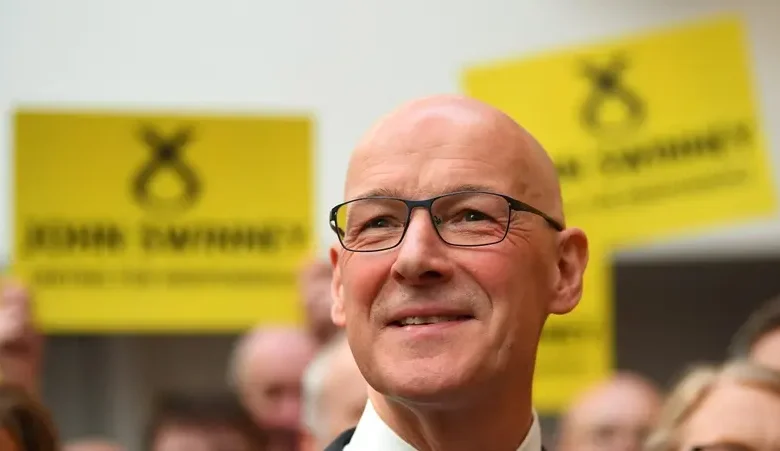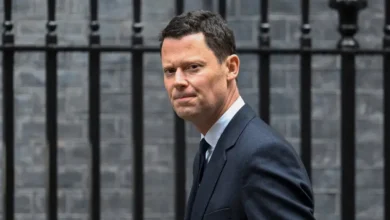John Swinney to become Scotland’s new leader after Humza Yousaf’s resignation

Scotland’s likely next leader John Swinney is a political veteran who will have to unify his fractured separatist party and revitalise its flagging independence movement.
The 60-year-old belongs to the Scottish National Party’s (SNP) old guard, and is an ally of tarnished ex-first minister Nicola Sturgeon, whom he loyally served as deputy for a record nine years.
“I am deeply honoured to have been elected as Leader of @theSNP. I will give all that I have to serve my Party and my Country,” Swinney, who joined the party as a teenager in 1979, said on social media on Monday.
He is expected to give a speech later in the day.
Humza Yousaf, who had become the first Muslim to lead a democratic western European nation in March 2023, resigned last week after his decision to end a coalition with the Green Party backfired, triggering a contest to pick his replacement.
Shortly after midday on Monday, the deadline for other contenders to join the race, the SNP confirmed Swinney as the new leader, ending uncertainty around a possible weeks-long process that would have ensued if there were more candidates.
Former finance minister Kate Forbes, who narrowly lost a leadership contest to Yousaf when Nicola Sturgeon resigned as leader, was expected to challenge Swinney for the premiership, but ruled herself out on Thursday. Forbes had said she and Swinney shared a “common purpose.”
Over the weekend, there were also reports that party activist Graeme McCormick was hoping to challenge Swinney for the leadership, but Sky News reported late on Sunday that he had decided not to proceed with his nomination,citing a statement from him.
Swinney is viewed as a calm head capable of stabilising Scotland’s ruling party following 39-year-old Humza Yousaf’s turbulent leadership and repairing its broken relationship with former power-sharing partners the Greens.
But detractors say Swinney — who has led the party before — represents more of the same, and is damaged by his defence of former boss Sturgeon, who was arrested in an ongoing party finances scandal.
“He could hardly be closer to the now discredited Sturgeon leadership so distancing himself from that will be a challenge,” politics professor James Mitchell, of Edinburgh University, told AFP.
“(But) Swinney is the ultimate party man, loyal to a fault. He is very well liked in the SNP because of this.”
Born in Edinburgh in April 1964, Swinney joined the SNP when he was 15, quickly rising through its ranks and becoming national secretary in the mid-1980s.
He first became a lawmaker in 1997 when he was elected to the UK parliament in London to represent a constituency in Tayside, in the heart of Scotland.
Two years later, he was elected to Scotland’s regional parliament at Holyrood in Edinburgh when it was re-established after more than 300 years, with Labour at the helm. Swinney first became SNP leader in September 2000 following the departure of Alex Salmond.
But he endured a torrid four years in charge as the SNP’s fortunes slumped during the early days of Scotland’s devolved parliament and the height of New Labour mania under UK Prime Minister Tony Blair.
Despite an expenses scandal forcing then-Labour first minister Henry McLeish from office in 2001, the opposition SNP still lost several seats at Holyrood in the 2003 Scottish parliamentary election.
Swinney saw off a leadership contest from an SNP activist but was forced to step down after a dismal showing at the 2004 European Parliament elections.
‘Unite’
His political career enjoyed a rebirth in 2007 when the SNP, then under the leadership of Salmond again, became the largest party at Holyrood and Swinney became finance minister.
He became deputy first minister in 2014 after Sturgeon succeeded Salmond following an independence referendum in which Scotland voted to remain part of the UK.
Swinney occupied several ministerial roles under Sturgeon, including education minister, and gained a reputation for being a steady and trusted hand.
He faced challenges, though, and twice survived no confidence votes, including over his refusal to publish legal advice during an inquiry into the flawed handling of harassment complaints against Salmond.
After Yousaf succeeded Sturgeon in March last year, Swinney stepped down from government, saying it was time for a “new generation” to lead.
Since then, internal divisions have been laid bare between progressives pushing trans rights and tough action against climate change, and more conservative members interested in core issues such as the economy.
All while the SNP faces pressure from a resurgent, union-supporting Labour party that is tipped to form the next UK government following an election due later this year.
Swinney couldn’t resist the call by senior SNP figures to return to try to revive his party’s fortunes.
“I want to unite the SNP and unite Scotland for independence,” he said, launching his leadership bid on Thursday.
After proposed challenger Kate Forbes announced she would not be running, Swinney’s coronation as SNP leader, and Scotland’s next first minister, looks assured.










